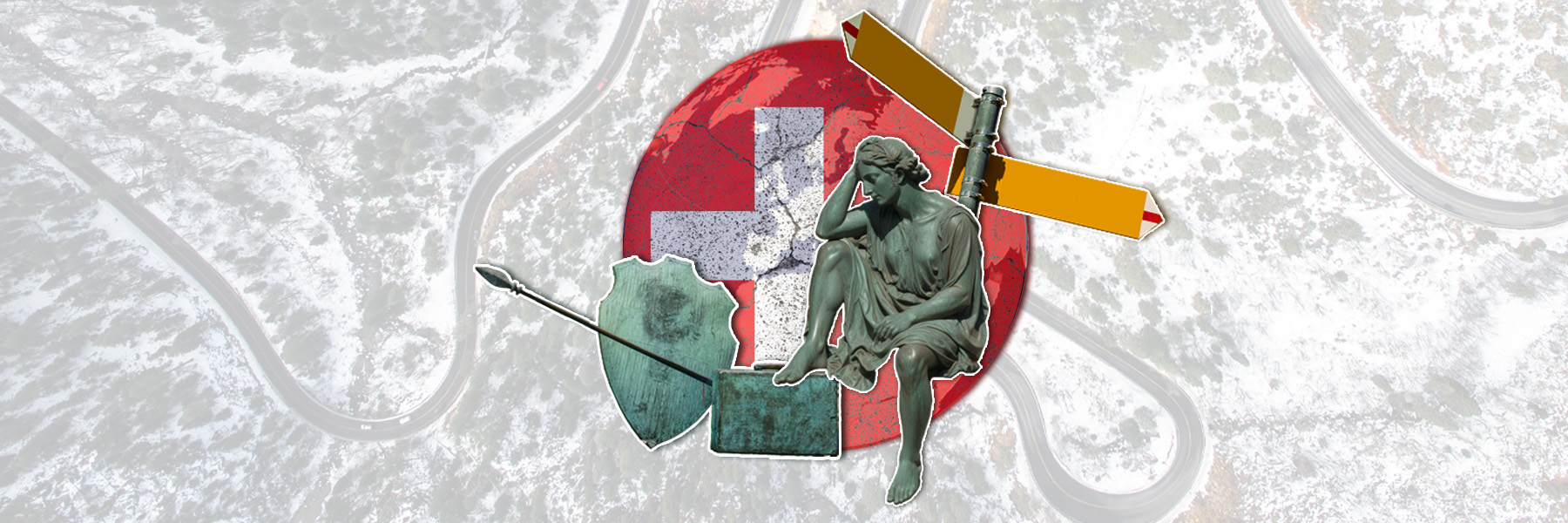
The whole world is discussing neutrality with us

Russia’s war against Ukraine has spurred deep reflection on numerous issues, not least the role and understanding of neutrality. For some weeks, SWI swissinfo.ch users around the world have been taking part in an insightful exchange in ten languages.
“What does the word ‘neutrality’ mean?” This is how a SWI user from Japan opens her post, before answering the question herself: “Neutrality means not taking sides in a war. For me, economic sanctions are also a form of war … So I believe [the Swiss] have stopped being ‘neutral’ and have sided with Ukraine.”

Another user from Japan, “Aka Hoppy”, disagrees: “In the wars for hegemony of the past, neutrality made sense; but today … it is not an option between a state that suppresses human rights and a liberal country.”
Not only SWI users from Japan are actively discussing the future of democracy. Since mid-March we have seen some 100 comments on our multi-lingual debate on this topic and received hundreds of follow-up comments.
More
Many users from Switzerland are also contributing to the neutrality debate. “Switzerland must remain strictly neutral at all times,” writes a French-speaking commentator, because “neutrality is the bedrock on which our country’s strength and way of life are founded.”
“Tiktok2021” is less categorical: “In ‘Western’ countries Swiss neutrality is often seen as a fig leaf for mercantilist desires. As Swiss, we should think about how our neutrality can be used in future for the good of humanity.”
New ‘non-state’ definition of neutrality
English-speaking user “Nick Kyriazi” has similar thoughts. “I submit a new definition of neutrality: the government takes no position.” Instead, “individuals and companies decide for themselves which side to be on. […] I have been debating whether or not to continue buying Apple products because I don’t like the idea of supporting the Chinese government in its suppression of Hong Kong and the Uyghurs (and its own people).”
In the first few weeks numerous users from Ukraine and Russia also followed the SWI neutrality debate. And no wonder, since the term “neutrality” has repeatedly cropped up in the negotiations between the two states on ending the Russian war of aggression. In an interview with independent Russian media representativesExternal link, Ukrainian President Volodymyr Zelensky said that a peace agreement with a “neutral” Ukraine would have to be submitted to the country’s citizens for ratification in a referendum. But he left open the question of what form such neutrality might take.
There are many variations of neutrality, and finding one that meets the conflicting needs of Kyiv and Moscow will not be easy. On April 7 Zelensky told the Jerusalem Post: “We cannot talk about [Ukraine as the] ‘Switzerland of the future’ – it will probably be a long time before our state can be like that.”

Major hurdles to a ‘sustainable’ solution
Eric Golson, who researches trade wars at the University of Surrey in the UK, wrote his dissertation on the neutrality of Switzerland, Sweden and Spain during the Second World War. He thinks the Ukrainian president’s declarations of intent regarding neutrality make sense, but “in order to sustain neutrality domestically in the long term, a strong civil society and strong and credible state institutions are needed”. These are currently being brutally destroyed in Russia’s war against Ukraine.
As for the all-important international dimension, Golson believes that a referendum on the question within Ukraine would “definitely lend greater credibility to neutrality”.
This is also the view of Swiss political scientist Pascal Lottaz, who teaches neutrality studies at Waseda University in Tokyo. “It is a good idea, and also helps protect the president. Zelensky has to be able to anchor any future deal in his own population,” he said.
Lottaz was impressed by the discussion held on SWI in ten languages. “The topic has travelled far and wide and has generated many opinions. The question of balancing military and economic means was frequently addressed, and that really is the key point here.”
Of course, the neutrality debate does not stop at Switzerland, which has one of the longest traditions in this field in the world.

More
What does the future hold for Swiss neutrality?
After Switzerland imposed sanctions against Russia, right-wing conservatives launched the idea of a popular initiative to enshrine the concept of “integral neutrality” in the constitution. Such a move would prevent the cabinet from participating in economic sanctions. Up to now, Switzerland has pursued a policy of “qualified neutrality”, which allows measures such as those adopted in the case of Ukraine.
‘Neutral in the face of atrocities?’
Support for a more open interpretation of “neutrality” comes from the liberal think-tank Avenir Suisse.
“For us, closer cooperation with NATO and the EU would not violate the principles of neutrality laid down in the Hague Conventions,” says Lukas Rühli, who has written a new studyExternal link on security policy for Avenir Suisse.
“We can assume that, in a future characterised by increased bipolarity between liberal democracies and state capitalist autocracies, Switzerland will increasingly interpret its neutrality policy in favour of those countries that share the same values,” he said.
Meanwhile, an Italian-speaking contributor to the SWI debate went straight to the heart of the matter, after the Russian war crimes in Ukraine came to light: “How can we remain neutral in the face of such atrocities?”

In compliance with the JTI standards
More: SWI swissinfo.ch certified by the Journalism Trust Initiative































You can find an overview of ongoing debates with our journalists here . Please join us!
If you want to start a conversation about a topic raised in this article or want to report factual errors, email us at english@swissinfo.ch.